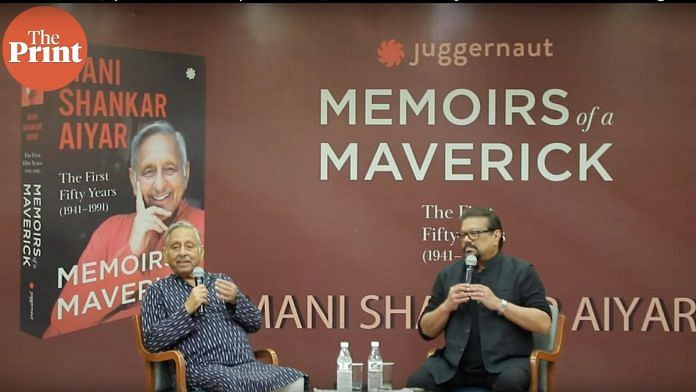New Delhi: There was pin drop silence when Congress leader and former diplomat Mani Shankar Aiyar said Prime Minister PV Narasimha Rao was the first Bharatiya Janata Party Prime Minister of India.
He expands on this conclusion in his autobiography, Memoirs of a Maverick: The First Fifty Years (1941 – 1991).
“The whole of the 1990’s story is told in this book — it is when I discovered how communal, how Hindu oriented P.V. Narasimha Rao was,” said Aiyar in a conversation with Vir Sanghvi during the book launch at the India International Centre on Wednesday. And “it [the 1990s] foreshadowed how he [PV Narasimha Rao] would be sitting doing puja while the Babri Masjid was being brought down.”
Describing Rao’s view on secularism in India, Aiyar spoke of an instance where the former prime minister called him aside from the Ram-Rahim yatra and let him know that he disagreed with his definition of secularism.
“Mani [Shankar Aiyar], you do not seem to understand that this is a Hindu country,” Rao purportedly told Aiyar during the conversation.
And this brought the conversation to secularism. Aiyar, known for his quips and witticisms, spent a substantial part of the discussion describing the secular nature of his upbringing and school years at Doon School, Dehradun — highlighting how his assembly prayers were drawn from several religions but presented without any religious bias.
“We ended up living in school in a completely secular atmosphere, in which nobody looked at anybody else and said you were a Muslim or whatever it was,” he said.
It was this atmosphere that enabled him, “to confront the India of the 20th and 21st century”. And that India is a country of immense diversity. One in which “we can only live in unity if we all respect each other as human beings and accord equality to each other as citizens of India and not indulge in majoritarianism, which inevitably leads to authoritarianism,” he said to rousing applause from the audience.
Former vice-president of India Hamid Ansari, Sonia Gandhi, former foreign secretaries Shyam Saran and Shivshankar Menon and current Member of Parliament Manish Tewari were some of the A-list attendees who had gathered to listen to Aiyar’s wit and self-deprecatory humour.
Also read: 12,000 yrs, 101 chapters and one question—How many pasts does India have?
Mizoram and Gandhi
The common refrain about Rajiv Gandhi and Aiyar’s relationship stems from their days at Doon School and the University of Cambridge. Aiyar clarifies in his book that theirs was an “official relationship,” and went further to describe the all of two instances he remembers interacting with Gandhi — once in school and once at university — before his time at the Prime Minister’s Office (PMO).
“Although I was never a friend, over the years I grew close enough to him to be just about his closest acquaintance,” writes Aiyar in his book.
Despite clarifying the nature of his relationship with Gandhi, Aiyar said he admires Rajiv Gandhi and described him as the “most upright, honest, straightforward, principled human being I have ever seen.”
“He [Rajiv Gandhi] did what was right and always put national interest above party interest and that is how he brought peace to Assam, that is how he brought peace to Punjab, that is how he brought peace to Darjeeling and above all brought peace to Mizoram,” Aiyar added
Expanding further on Gandhi’s efforts in Mizoram, Aiyar described how Gandhi asked the “leading insurgent in Mizoram” – Laldenga to become the Chief Minister of Mizoram without an election and going so far as to ordering Lalthanhawla, the Congress Chief Minister at the time – whom Laldenga had tried for nearly two decades to assassinate – to become Laldenga’s deputy. This, Aiyar claimed, helped make Mizoram the most “peaceful” state in India.
As the evening wore on with laughter and stories, Aiyar also had some choice words for RK Dhawan – the former personal secretary to Indira Gandhi – stating that Gandhi’s biggest mistake was bringing “this awful R.K. Dhawan” in to the PMO. Aiyar also referred to former Prime Minister of India Vishwanath Pratap Singh and “his band of traitors” when explaining the swirl of controversies surrounding Rajiv Gandhi—Bofors, Shah Bano, the Indian Peacekeeping Forces (IPKF) in Sri Lanka, and the various state accords such as the Punjab Accord and Assam Accord signed by Gandhi—all of which is the subject of his next book.
Steven R Weisman, Aiyar’s good friend and New York Times former New Delhi bureau chief, once remarked that he had ‘an amazing talent to abuse and amuse’, the audience witnessed both sides of Mani Shankar Aiyar.
(Edited by Theres Sudeep)



